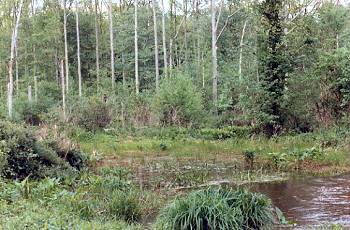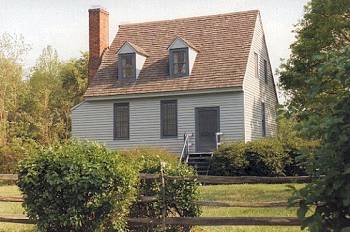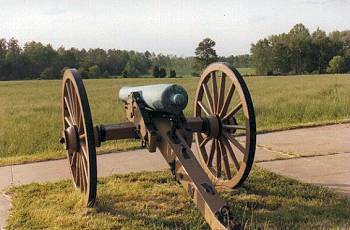|
(8-85) Richmond
Battlefields Visitor Center
Any visit to
the battlefields of the Peninsula Campaign or other battles fought around
Richmond should start here at the Visitor Center of the Richmond
Battlefields. To cover the area of the Seven Days battles requires a drive
of approximately 80 miles along an arc to the east of Richmond
 The 1862
Peninsula Campaign The 1862
Peninsula Campaign |
|
(8-85) Seven
Days Battles: Beaver Dam Creek
Advancing on
Richmond, the bulk of McClellan's army was south of the Chickahominy River;
however, the corps of General Fitz-John Porter was on the north side.
Porter's corps was too tempting a target for the newly appointed commander
of the Confederate forces, General Robert E. Lee. Lee struck Porter here at
Beaver Dam Creek (also called the Battle of Mechanicsville or Battle of
Ellerson's Mill)
Porter was to have been attacked in the flank by the troops of Stonewall
Jackson, newly arrived from the Shenandoah Valley, but Jackson was late and
the attack never came off. Porter's Federal troops beat off the Confederate
attacks and withdrew to Gaine's Mill
This photo illustrates the type of terrain that typifies the battlefields of
the Seven Days |
|
(8-85) Seven
Days Battles: Gaines' Mill
Built around
1835, the Watt House served as the headquarters of Union General Fitz-John
Porter during the Battle of Gaines' Mill ( also known as the Battle of
Boatswain's Creek or Battle of First Cold Harbor)
Gaines' Mill nearly had the same outcome as the Battle of Beaver Dam
Creek; however, late in the afternoon, troops from Georgia and Hood's
Texas Brigade cracked the Federal line. McClellan then began the movement
he termed a "change of base". In reality, it began the retreat of
McClellan's army from the Peninsula |
|
(8-85) Seven
Days Battles: Malvern Hill
After sharp
battles at Glendale (Frayser's Farm), White Oak Swamp and Savage's
Station, McClellan withdrew to Malvern Hill near the James River
This was Lee's last chance to snare the Union Army, but it was not to be.
Successive waves of Confederate attackers were mown down by massed Federal
artillery fire and the fire from supporting Union gunboats on the James
This 12-pounder Union Napoleon looks across the fields where Lee's men
tried again and again in a vain attempt to crush McClellan's Union army.
After the battle "Little Mac" withdrew to his base at Harrison's Landing |



